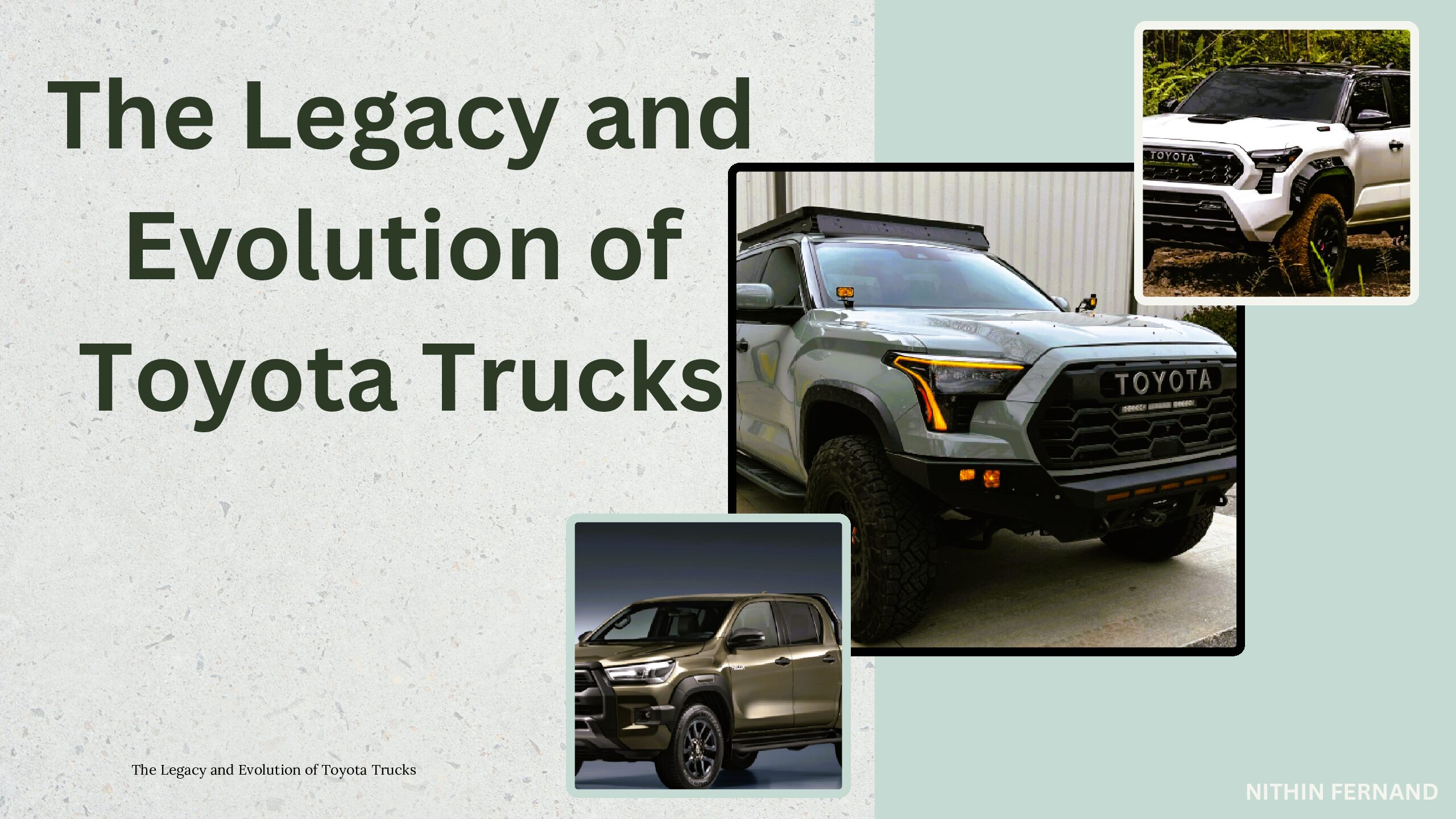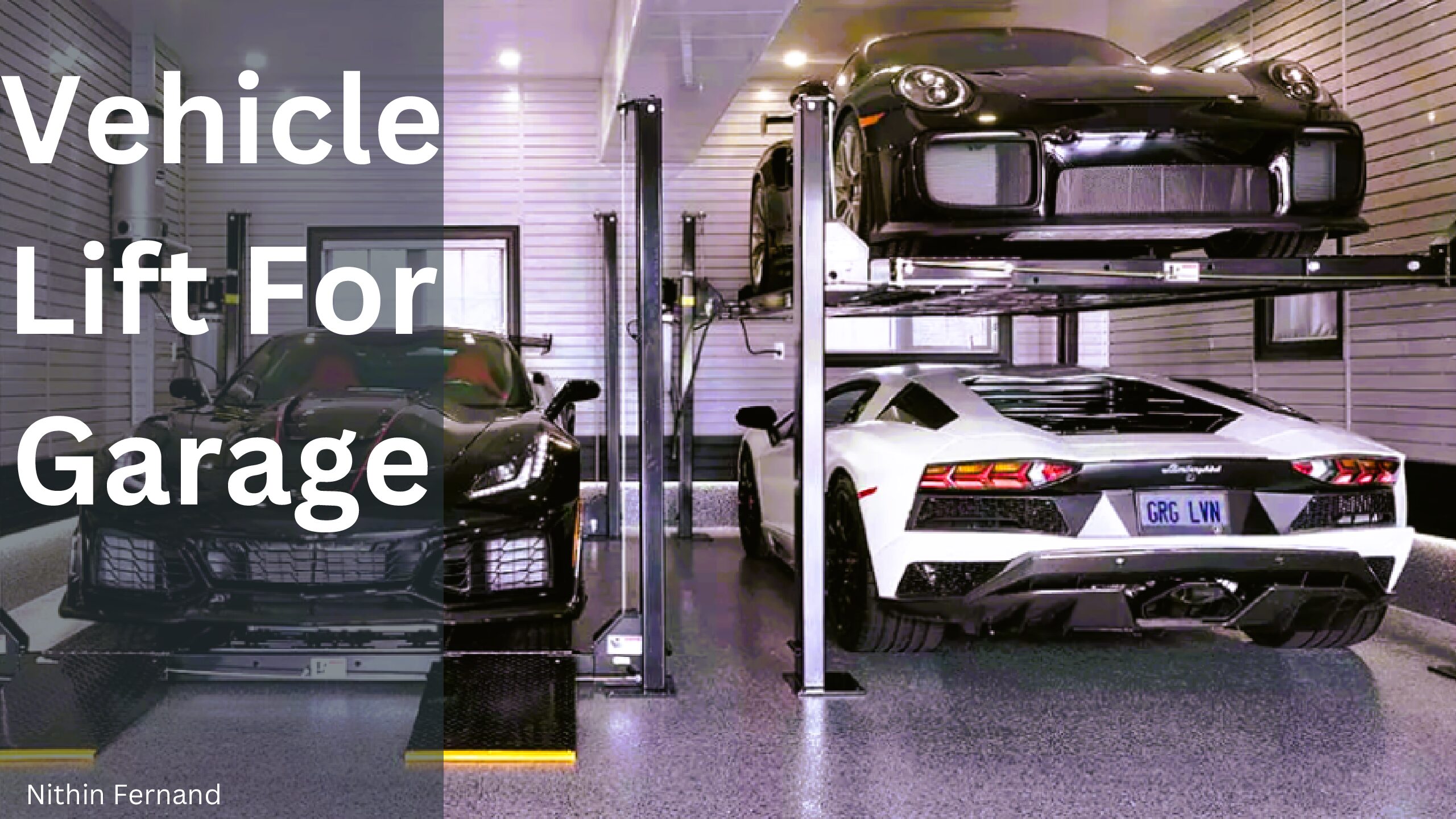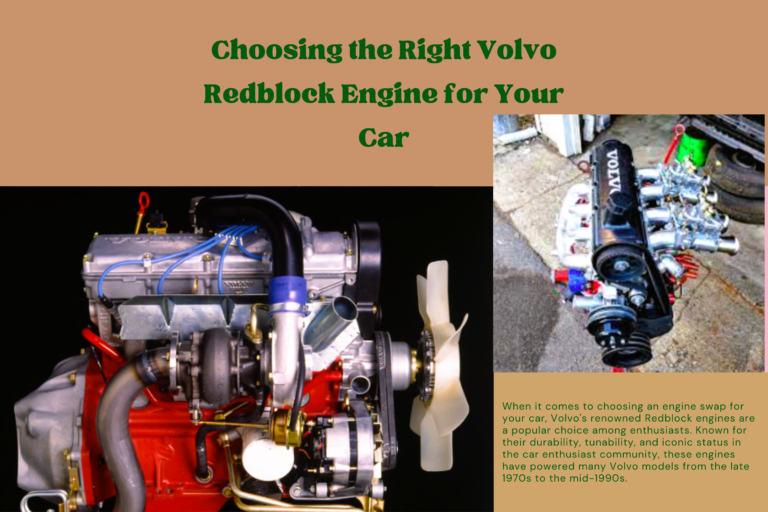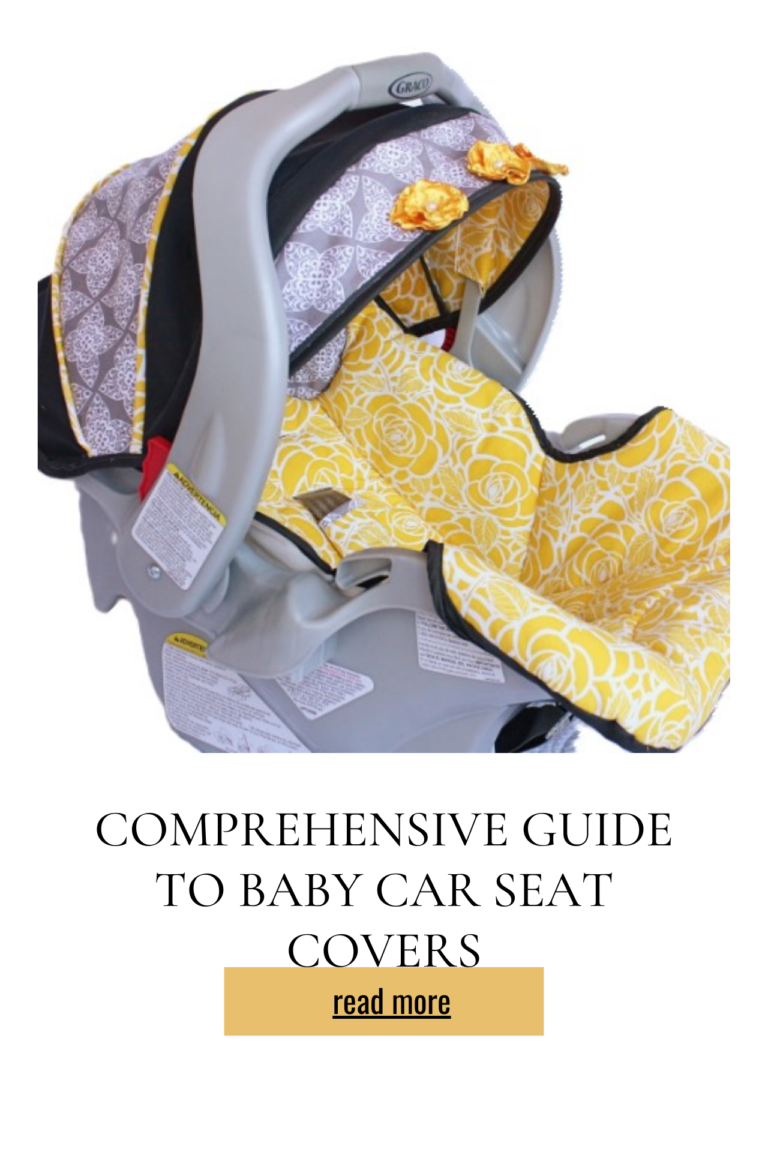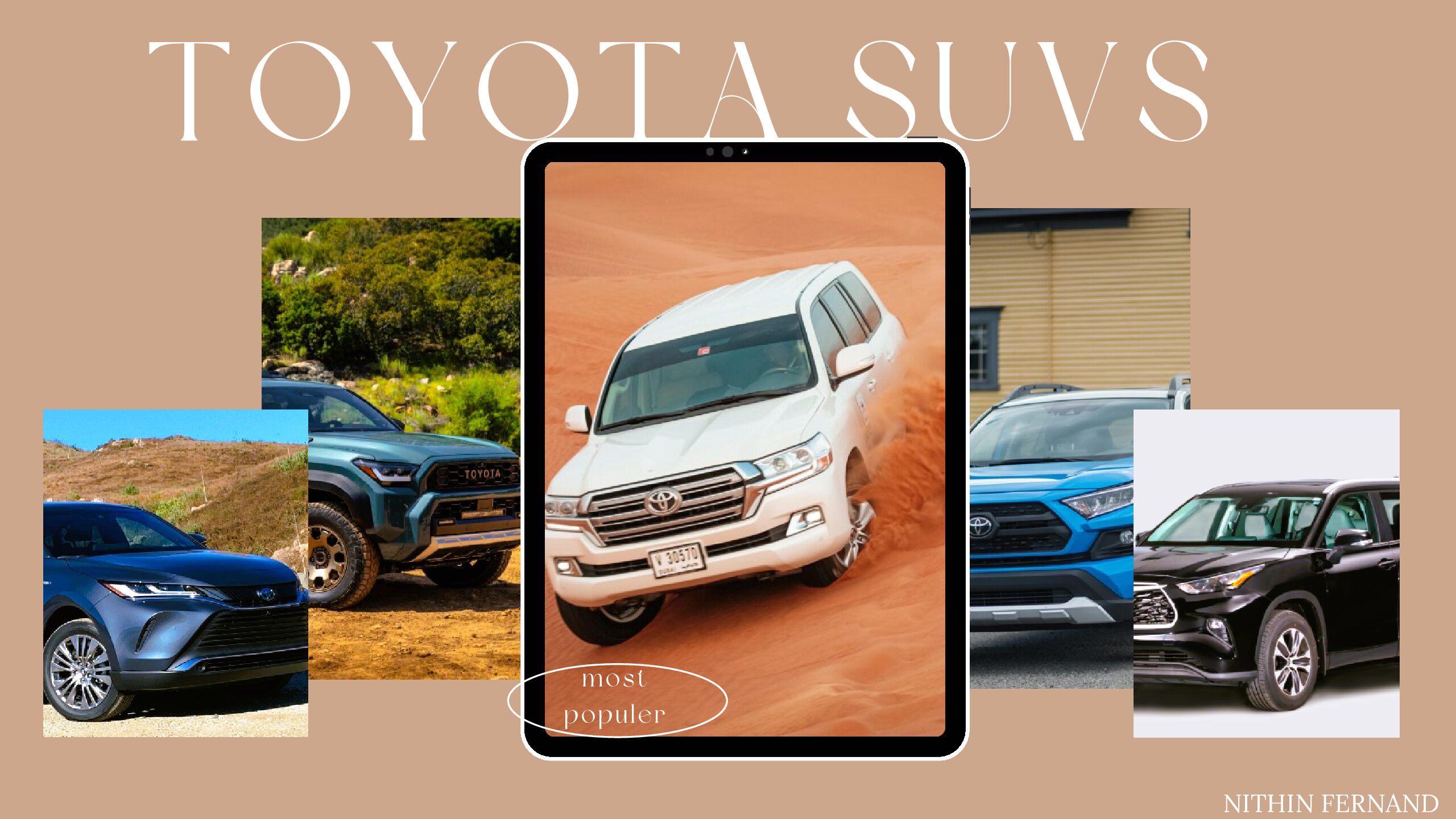The Legacy and Evolution of Toyota Trucks in 2024
Toyota Motor Corporation, a name synonymous with reliability and innovation, has solidified its reputation as one of the world’s leading automotive manufacturers. Founded in 1937, Toyota has expanded its footprint across various vehicle segments, but the company’s commitment to producing durable and dependable vehicles has made its trucks especially notable.
Trucks play a pivotal role in Toyota’s offerings, catering to a diverse range of customers—from construction workers requiring heavy-duty performance to families seeking reliable vehicles for everyday use. The Toyota truck lineup, renowned for its reliability, performance, and adaptability, comprises several iconic models that have made a significant impact in both domestic and global markets.
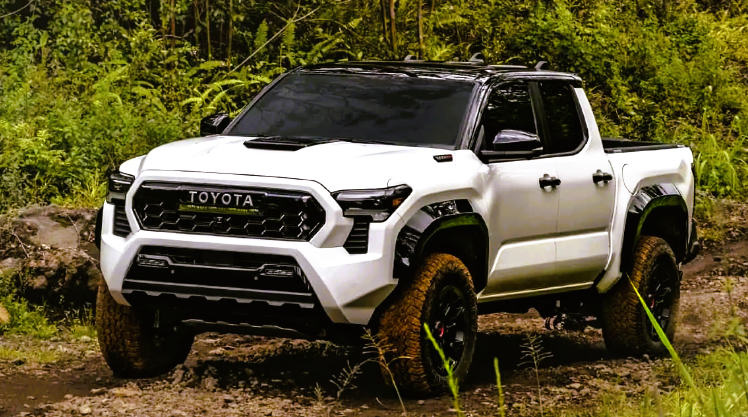
This article delves into the legacy and evolution of Toyota trucks, highlighting their rich history, examining iconic models such as the Toyota Hilux, Tacoma, and Tundra, and exploring the engineering innovations that set them apart from competitors. Furthermore, we’ll discuss their off-road capabilities, market presence, and ongoing commitment to sustainability, illustrating why Toyota trucks continue to be a preferred choice for consumers around the world.
Table of Contents
History of Toyota Trucks
Early Beginnings
- Introduction of the First Toyota Truck Models
- Toyota’s journey into the truck market began in the late 1940s with the introduction of the Toyota SB in 1947, which was a light truck designed primarily for commercial use. It was built to address the increasing demand for durable and versatile vehicles in post-war Japan.
- Following the SB, Toyota released the Toyota Stout in 1954, which marked the brand’s first foray into the pickup truck segment. The Stout was ideal for both industrial and agricultural uses, establishing the foundation for the brand’s reputation in the truck market.
- Influence of Post-War Japan on Truck Design
- The post-war era in Japan saw a transformation in the automotive industry, driven by the need for transportation solutions that could support economic recovery and growth. As agriculture and industry began to rebound, the demand for reliable transport vehicles surged.
- Toyota’s early truck designs were influenced by the practical needs of consumers, emphasizing durability, cost-effectiveness, and utility. This approach not only catered to the local market but also paved the way for future expansions into international markets.
Evolution through the Years
- Key Milestones in Toyota Truck Development
- The introduction of the Toyota Hilux in 1968 marked a significant milestone in the evolution of Toyota trucks. Known for its robustness and go-anywhere capability, the Hilux quickly gained popularity and established a legacy that continues to this day.
- The 1970s and 1980s saw advances in design and engineering with the introduction of features that enhanced comfort and drivability. The Hilux became a global icon, especially after being featured in extreme conditions and popular culture.
- In 1995, the Toyota Tacoma was launched as a successor to the Hilux in North America, solidifying Toyota’s presence in the mid-size truck market and offering consumers a combination of performance and comfort tailored to the North American lifestyle.
- Examples of Popular Models Over the Decades
- Toyota Hilux: As one of the most enduring models in Toyota’s lineup, the Hilux has remained popular for over five decades, known for its resilience and versatility. The Hilux has gained a reputation for being virtually indestructible, which has contributed to its following.
- Toyota Tacoma: Introduced in the mid-1990s, the Tacoma quickly became a favorite among mid-size truck buyers in North America. Its combination of off-road capability, stylish design, and robust performance has kept it at the forefront of the truck segment.
- Toyota Tundra: Launched in 1999, the Tundra was Toyota’s first full-size pickup truck aimed at the American market. With a focus on power and towing capacity, the Tundra has evolved to compete with established American brands in this competitive segment.
Through continuous innovation and a focus on consumer needs, Toyota has managed to maintain a significant presence in the global truck market, with models that cater to a wide range of preferences and driving conditions. The legacy of Toyota trucks reflects a commitment to quality and functionality that resonates with drivers around the world.
Iconic Toyota Truck Models
A. Toyota Hilux
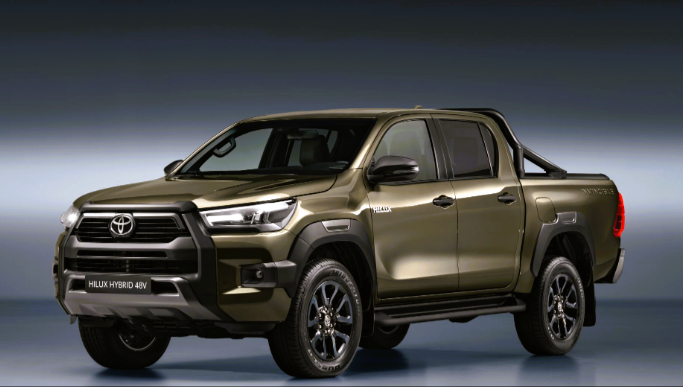
Toyota Hilux Review
- Overview and Key Features
- The Toyota Hilux, first introduced in 1968, is a compact pickup that has become synonymous with reliability and strength. Known for its rugged construction, the Hilux features a robust chassis, powerful engine options, and advanced off-road capabilities.
- Key features include available 4WD systems, high ground clearance, and off-road suspension, making it suitable for various terrains. The Hilux is also known for its spacious cabin and utility-focused bed design, offering practical storage solutions.
- Global Impact and Popularity
- The Hilux has achieved immense global success, being sold in over 140 countries and recognized as one of the best-selling vehicles worldwide. Its enduring popularity stems from its versatility, appealing to both commercial users and everyday drivers.
- In markets like Australia and Africa, the Hilux is particularly favored for agriculture, construction, and adventure, solidifying its status as a trusted workhorse.
- Cultural Significance
- The Toyota Hilux has garnered a prominent place in popular culture, known for its portrayal in films, television shows, and sports. It was famously featured in the BBC series “Top Gear,” where it was subjected to extreme tests, showcasing its durability.
- The Hilux has also found a place in various sports and adventure contexts, especially among off-road enthusiasts and rally participants, further enhancing its global appeal.
B. Toyota Tacoma
- Introduction and Positioning in the Mid-Size Truck Market
- Launched in 1995 as a successor to the Toyota Hilux in North America, the Tacoma is positioned as a durable and versatile mid-size pickup truck. It was designed to compete with other midsize trucks, offering a balance of utility and everyday drivability.
- The Tacoma has evolved over the years, continuously incorporating industry trends and consumer feedback to enhance its practical features and performance.
- Features that Distinguish it from Competitors
- The Tacoma is distinguished by its off-road capabilities, particularly with the TRD (Toyota Racing Development) variants that come equipped with off-road-tuned suspensions, skid plates, and all-terrain tires.
- Additional unique features include its innovative Toyota Safety Sense suite, advanced towing capabilities, and an array of customization options that allow owners to tailor their trucks to specific needs—whether for work or play.
- Popularity in North America
- The Toyota Tacoma has consistently ranked as one of the top-selling mid-size trucks in the United States. It has garnered a dedicated fan base, particularly among outdoor enthusiasts who appreciate its off-road prowess.
- Its combination of dependability, resale value, and a strong reputation for longevity contributes to its sustained popularity, with many owners choosing to upgrade to newer models rather than switch to competing brands.
C. Toyota Tundra
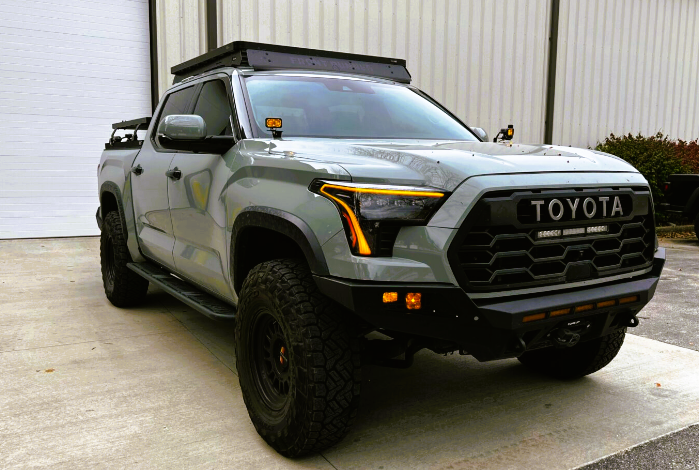
Toyota Tundra Review
- Overview of Full-Size Truck Offerings
- The Toyota Tundra was introduced in 1999 as Toyota’s first full-size pickup designed specifically for the North American market. It has since established itself as a serious competitor among full-size trucks, combining Toyota’s reputation for reliability with the capabilities expected from larger pickups.
- The current generation features modern styling, spacious interiors, and a variety of powerful engine options, including a hybrid variant aimed at performance and efficiency.
- Comparison with American Full-Size Trucks
- When compared to American full-size trucks like the Ford F-150 and Chevrolet Silverado, the Tundra stands out for its build quality and reliability. However, it has historically lagged behind in terms of overall towing and payload capacities.
- Despite this, the Tundra has made significant improvements, offering competitive capabilities and advanced features while maintaining a loyal customer base.
- Features and Capabilities
- The Tundra is known for its impressive towing capacity, capable of handling over 10,000 pounds when properly equipped. Its spacious cabin design also prioritizes comfort, featuring high-quality materials and advanced technology.
- Notable features include a versatile infotainment system, enhanced safety features, and a robust suite of off-road options in the TRD Pro variants, positioning the Tundra as a well-rounded full-size truck capable of meeting various buyer needs.
Each of these iconic models—Hilux, Tacoma, and Tundra—reflects Toyota’s commitment to quality and innovation, cementing the company’s legacy in the truck market and appealing to a wide range of consumers.
Design and Innovation
Engineering and Reliability
- Reputation for Durability and Reliability
- Toyota trucks are renowned for their exceptional durability and reliability, making them a preferred choice for both personal and commercial use. The brand’s vehicles, especially the Hilux, Tacoma, and Tundra, have consistently received high marks in consumer reliability surveys and industry evaluations.
- This reputation stems from rigorous testing and quality control processes, which ensure that each vehicle can withstand harsh conditions and high mileage. Many Toyota truck owners report driving their vehicles for well over 200,000 miles without significant issues, reinforcing the brand’s commitment to longevity.
- Unique Engineering Aspects that Contribute to Longevity
- Toyota employs advanced engineering techniques such as body-on-frame construction, particularly in its truck lineup. This method enhances strength and stability, allowing for superior handling and durability, especially when hauling loads or navigating rough terrain.
- Additionally, Toyota uses high-quality materials and corrosion-resistant coatings on critical components to extend the lifespan of the truck. Features like reinforced frames, robust suspension systems, and state-of-the-art manufacturing practices help ensure that Toyota trucks maintain their performance and integrity over years of use.
Technological Advancements
- Introduction of Hybrid Models (e.g., Tundra Hybrid)
- Toyota has taken significant strides in hybrid technology, exemplified by the introduction of the Tundra Hybrid. This model combines a powerful twin-turbo V6 engine with an electric motor to enhance fuel efficiency while maintaining impressive power and towing capacity.
- The move towards hybrid trucks reflects Toyota’s commitment to sustainability and innovation, catering to environmentally conscious consumers without sacrificing the performance and capabilities expected from full-size pickups.
- Safety and Driver-Assist Technologies
- Toyota prioritizes safety in its truck designs, equipping models with the Toyota Safety Sense suite of advanced safety features. This includes collision avoidance systems, adaptive cruise control, lane departure alerts, and automatic high beams, which help protect drivers and passengers.
- Moreover, newer Toyota trucks incorporate driver-assist technologies such as blind-spot monitoring, rear cross-traffic alert, and parking assistance, enhancing overall safety and ease of use, particularly in challenging driving conditions.
- Infotainment and Connectivity Features
- Toyota trucks are equipped with modern infotainment systems that integrate seamlessly with smartphones through systems like Apple CarPlay and Android Auto. This connectivity enables drivers to access navigation, music, and communication apps easily while on the road.
- Additionally, features like touchscreen displays, voice recognition controls, and premium audio systems contribute to a more enjoyable driving experience. Advanced navigation systems and real-time traffic updates further enhance usability, making Toyota trucks not only tools for work but also centers of comfort and connectivity.
Through a combination of robust engineering, innovative hybrid technology, advanced safety features, and cutting-edge infotainment systems, Toyota trucks embody a commitment to quality and modernity that positions them as leaders in the automotive market. This focus on design and innovation ensures that Toyota trucks remain competitive and appealing in a rapidly evolving industry.
Off-Road Capabilities
A. TRD (Toyota Racing Development) Models
- Overview of TRD Pro Series
- The TRD Pro series represents Toyota’s commitment to off-road enthusiasts, combining the brand’s engineering prowess with high-performance features tailored specifically for rugged terrains. Introduced in 2014, the TRD Pro lineup includes models like the Tacoma TRD Pro, Tundra TRD Pro, and 4Runner TRD Pro.
- Each TRD Pro model is designed to enhance capability and durability in off-road conditions, showcasing Toyota’s heritage in motorsports and off-road racing. This series is aimed at consumers who require a vehicle capable of handling extreme environments without the need for extensive aftermarket modifications.
- Features Optimized for Off-Road Performance
- TRD Pro vehicles come equipped with several specialized features, including upgraded suspensions with Fox shocks for superior shock absorption and handling over rough terrain. This design improves articulation and stability, crucial for navigating obstacles.
- Other enhancements often include reinforced skid plates to protect vital components from rocks and debris, all-terrain tires designed for traction on various surfaces, and additional ground clearance to tackle challenging landscapes.
- The TRD Pro models also offer advanced off-road technologies such as Crawl Control, Multi-Terrain Select, and locking differentials, enabling drivers to navigate steep hills, muddy paths, and rocky trails with confidence.
B. Comparison to Off-Road Competitors
- Comparison with Rival Brands and Models
- When compared to rival off-road models such as the Ford Raptor, Chevrolet Colorado ZR2, and Jeep Gladiator Rubicon, Toyota’s TRD Pro series stands out for its reliability and established reputation. While competitors may excel in specific areas, such as raw power or advanced technology features, Toyota trucks often provide a balance of capability, dependability, and comfort.
- The TRD Pro models are characterized by their ease of use; their off-road features are user-friendly and accessible, making them suitable for both novice and experienced off-road drivers. Additionally, Toyota’s strong resale value and reliability further enhance their appeal compared to competitors.
- Recognition in Off-Road Communities
- Toyota trucks, particularly in their TRD Pro form, hold a respected position within off-road communities. Enthusiasts often praise the Hilux and Tacoma for their ruggedness and capacity to endure tough conditions, which have been validated in various off-road events and trails around the world.
- The brand has cultivated a strong presence in off-road events, sponsorships, and partnerships with off-road racing teams, which reinforces its commitment to the outdoor adventure market. Social media and dedicated off-road forums often feature Toyota models showcasing extensive modifications and adventures, further contributing to the vehicles’ legendary status.
- Events like the King of the Hammers and the Baja 1000 have seen Toyota vehicles performing valiantly, earning accolades from fans and competitors alike. The brand’s efforts in off-road racing and adventure are seen as endorsements of a culture that values exploration and capability.
Through the TRD Pro models, Toyota continues to innovate in the off-road segment, blending performance enhancements with everyday usability, ensuring that its trucks are not just capable of strong performance on tough terrain but also comfortable commuters. This balance, along with the strong reputation built over decades, solidifies Toyota’s legacy in the off-road community.
The Market and Customer Base
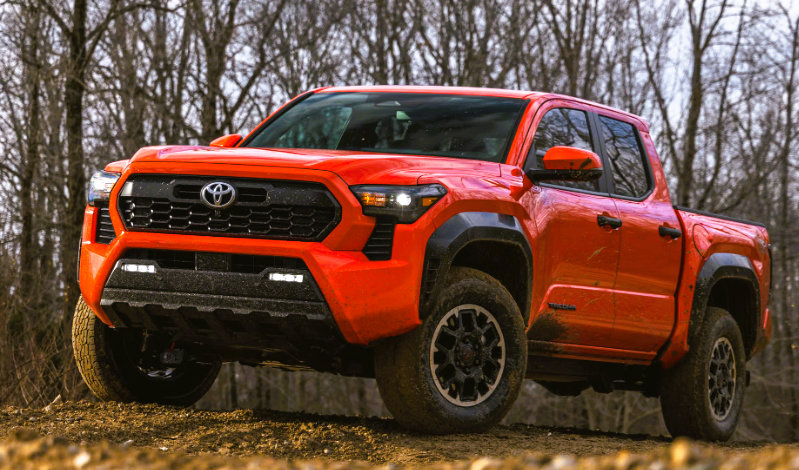
Target Demographics
- Typical Toyota Truck Buyers
- Toyota truck buyers typically encompass a wide range of demographics, including both individual consumers and commercial users. Among individual buyers, a significant portion consists of outdoor enthusiasts, tradespeople, and families looking for reliable and versatile vehicles.
- Younger buyers are increasingly drawn to models like the Tacoma for its blend of ruggedness and modern technology, while more established customers often gravitate toward the Tundra for full-size capabilities and dependability. The Hilux appeals strongly to international markets, particularly in Australia and various developing countries, where its reputation for toughness is well known.
- Trends and Preferences in the Truck Market
- A significant trend in the truck market is the growing preference for fuel efficiency and hybrid models as consumers become more environmentally conscious. Toyota’s introduction of hybrid options, such as the Tundra Hybrid, reflects this shift, appealing to eco-conscious buyers.
- There is also an increased interest in off-road capabilities, with many buyers favoring trucks equipped for adventure. This trend has prompted manufacturers to offer more rugged variants, such as the TRD Pro series, enhancing appeal among outdoor and off-road enthusiast demographics.
- Connectivity and technology are other critical factors for today’s buyers. Features such as advanced infotainment systems, driver-assist technologies, and safety features are no longer optional but expected in today’s competitive landscape.
Competitive Positioning
- Analysis of Toyota Trucks in the Context of the Broader Truck Market
- In the broader truck market, Toyota trucks hold a distinctive position characterized by their reputation for reliability, longevity, and versatility. The brand has a loyal customer base that values these attributes, which often outshine short-term promotional strategies of some competitors.
- The Toyota Tacoma consistently ranks as a top-selling mid-size truck in North America, capturing substantial market share from key rivals like the Ford Ranger and Chevrolet Colorado. Similarly, the Tundra competes strongly against full-size trucks such as the Ford F-150 and Ram 1500, appealing to consumers looking for a robust and reliable alternative.
- Toyota’s global reach with models like the Hilux allows it to dominate markets where durability and off-road capabilities are paramount, maintaining a competitive edge in regions such as Australia and Southeast Asia.
- Strengths and Weaknesses Compared to Competitors
- Strengths:
- Reliability and Durability: Toyota’s longstanding reputation for building reliable vehicles resonates with customers, often leading to high resale values and customer loyalty.
- Off-Road Capabilities: The TRD Pro series and other off-road variants place Toyota in a favorable position within the growing off-road segment of the market.
- Hybrid Innovations: The introduction of hybrid truck models reflects Toyota’s commitment to sustainability, catering to the evolving preferences of consumers.
- Lower Maintenance Costs: Many Toyota truck owners report lower maintenance costs over the lifetime of their vehicles compared to competitors, enhancing the brand’s overall appeal.
- Weaknesses:
- Less Power and Performance Compared to Some Rivals: While Toyota trucks are known for reliability, they may not always match the raw power and towing capabilities of competitors like the Ford F-150 and Ram 1500, particularly in high-performance variants.
- Limited Model Variants: Compared to competitors that offer a broader array of customizations and configurations, Toyota’s options can sometimes appear limited, which may deter some buyers seeking unique features or trims.
- Perception of Age: Some models may be perceived as outdated compared to competitors that continually refresh their designs and technologies; this perception could affect their appeal to younger buyers.
- Strengths:
Toyota trucks enjoy a strong market position characterized by loyal customers and a reputation for reliability and durability. While they face challenges from more powerful competitors and perceptions of limited options, ongoing innovations such as hybrid models and off-road capabilities continue to enhance their appeal in an ever-evolving automotive market.
The Evolution and Impact of Toyota SUVs in the Automotive Market 2024
NITHIN FERNAD
Environmental Considerations
A. Toyota’s Commitment to Sustainability
- Development of Hybrid and Hydrogen-Powered Trucks
- Toyota has been at the forefront of hybrid technology, initially popularized by the Prius and continuing with its truck lineup. The introduction of the Tundra Hybrid represents a significant step in the company’s efforts to provide more environmentally friendly options in the full-size truck segment. The hybrid system offers improved fuel efficiency without sacrificing the power and performance that truck buyers expect.
- Additionally, Toyota is actively researching and developing hydrogen fuel cell technology, with plans for future models that leverage this clean energy source. The company’s approach focuses on creating versatile and sustainable powertrains, aiming to reduce dependence on fossil fuels and lower greenhouse gas emissions.
- Initiatives Aimed at Reducing Carbon Footprint
- Toyota has set ambitious goals for sustainability, including a commitment to achieving carbon neutrality across its operations by 2035. This includes not only the vehicles it produces but also the manufacturing processes and supply chain management.
- The company is investing in sustainable manufacturing practices, such as utilizing renewable energy sources in production facilities and promoting recycling and waste reduction initiatives. By implementing these practices, Toyota aims to significantly lower its overall carbon footprint and contribute to a more sustainable future.
B. Consumer Preferences
- Trends Towards More Eco-Friendly Vehicle Options
- In recent years, there has been a marked shift in consumer preferences towards eco-friendly vehicles. Many consumers are now prioritizing fuel efficiency and lower emissions when selecting trucks, making hybrid and electric options increasingly attractive. This trend is especially prevalent among younger buyers who are more environmentally conscious and seek vehicles aligned with their values.
- Additionally, the rise of urbanization and environmental awareness has fostered a demand for vehicles that reduce overall ecological impact, driving manufacturers to innovate and offer greener options.
- Market Response to Toyota’s Sustainability Efforts
- The market response to Toyota’s sustainability initiatives has generally been positive, with many consumers applauding the brand’s efforts to lead the way in hybrid technology. The introduction of hybrid models like the Tundra Hybrid has received acclaim for its innovative approach to combining performance with sustainability.
- Toyota’s commitment to hydrogen technology has also garnered interest in markets where infrastructure supports such energy sources, showcasing the brand’s long-term vision for sustainable mobility.
- Moreover, Toyota’s marketing and communication strategies emphasize its sustainability efforts, resonating well with environmentally conscious consumers. The brand has positioned itself as a leader not just in reliability and durability but also in environmental responsibility, which enhances its appeal among the growing segment of eco-aware truck buyers.
Toyota’s commitment to sustainability through hybrid and hydrogen-powered trucks, alongside its initiatives aimed at reducing carbon footprints, aligns well with evolving consumer preferences for eco-friendly vehicle options. This proactive approach not only strengthens Toyota’s market position but also contributes positively to its reputation as a manufacturer dedicated to a sustainable future in the automotive industry.
Conclusion
Summary of Toyota’s Impact on the Truck Market
Toyota has made a significant and lasting impact on the truck market since its entry into the segment. The brand’s trucks, particularly the Tacoma and Tundra, have set benchmarks for reliability, durability, and versatility. Toyota’s engineering excellence and approach to manufacturing have established a reputation that resonates strongly with consumers and commercial users alike. By incorporating innovations like the TRD (Toyota Racing Development) performance enhancements, hybrid technology, and sustainability initiatives, Toyota has effectively adapted to changing consumer demands and preferences while maintaining its core values. The brand has not only achieved high sales and customer loyalty but has also influenced competitors to prioritize quality and reliability in their own models.
Future Prospects for Toyota Trucks
Looking ahead, Toyota is well-positioned to address the evolving trends in the truck market, particularly the rising demand for eco-friendly and technologically advanced vehicles. With ongoing investments in electrification, including hybrid and hydrogen fuel cell technologies, Toyota is positioned to lead in the sustainable truck segment. Additionally, the company’s commitment to improving off-road capabilities and expanding its model offerings will ensure it meets the diverse needs of its customer base. As the market embraces the shift toward electric vehicles, Toyota’s established brand recognition and loyal following will likely support its transition into this new era.
Final Thoughts on What Makes Toyota Trucks a Popular Choice Among Consumers
Toyota trucks stand out in the competitive automotive landscape due to their exceptional reliability, longevity, and customer satisfaction. The brand’s commitment to delivering vehicles that can perform under rugged conditions, coupled with advancements in technology and safety, aligns well with the demands of both everyday users and outdoor enthusiasts. Furthermore, Toyota’s focus on sustainability is increasingly aligning with consumer values, enhancing its appeal among environmentally conscious buyers. Ultimately, Toyota trucks combine proven performance with innovation, making them a preferred choice for consumers who seek quality, dependability, and versatility in their vehicular choices. This legacy of excellence, coupled with strategic growth initiatives, secures Toyota’s place in the hearts of truck buyers now and into the future.
References
List of Sources Used for Data and Statistics
- Toyota Motor Corporation Official Website: Provides detailed specifications, information on current models, and insights into corporate sustainability efforts.
- URL: Toyota.com
- Automotive News: Articles on market trends, sales statistics, and news regarding the automotive industry, including Toyota’s position in the truck market.
- URL: AutomotiveNews.com
- U.S. Department of Energy: Information on hybrid and hydrogen technologies, as well as emissions standards.
- URL: Energy.gov
- Consumer Reports: Evaluations and reviews of Toyota trucks, highlighting reliability ratings and user satisfaction surveys.
- URL: ConsumerReports.org
- Car and Driver: Provides comprehensive reviews, comparisons, and insights into Toyota trucks, performance data, and off-road capabilities.
- URL: CarAndDriver.com
- J.D. Power: reports on customer satisfaction, reliability ratings, and market analysis related to Toyota trucks and the automotive industry at large.
- URL: JDPower.com
Recommended Additional Reading or Viewing
- Books:
- “Toyota Trucks: The Ultimate Guide to the Ultimate Workhorse” by Michael G. Smith – A comprehensive look at the history and evolution of Toyota trucks.
- “The Toyota Way: 14 Management Principles from the World’s Greatest Manufacturer” by Jeffrey K. Liker While focused on Toyota’s overall business strategy, this book provides valuable insights into the company’s manufacturing principles that contribute to the quality of its trucks.
- Videos:
- YouTube Reviews and Comparisons: Channels like “TFL Trucks” and “Carwow” provide detailed video reviews and comparisons of Toyota truck models, highlighting their off-road capabilities, performance, and features.
- Toyota Official YouTube Channel: offers promotional videos, feature showcases, and insights into new models and technologies being developed by Toyota.
- Documentaries/TV Shows:
- “How It’s Made: Toyota Manufacturing”—a documentary segment exploring the manufacturing process behind Toyota trucks.
- “Top Gear Specials”: Episodes featuring off-road challenges and comparisons of various trucks, including Toyota models.
- Online Forums and Communities:
- TacomaWorld and TundraUp: Online communities where Toyota truck enthusiasts share experiences, modifications, and reviews, providing firsthand insights into ownership and performance.
These resources offer a deeper understanding of Toyota trucks, their evolution, and their role in the market, while also providing diverse perspectives through reviews, technical specifications, and user experiences.
FAQs
1. Which Toyota pickup is the best option?
The Tacoma, which is the best-selling midsize truck in the United States, and the full-size Tundra are now the most popular Toyota truck models. Both of these contemporary models perform well in truck functions such as hauling and off-roading, in addition to one non-truck function, which is achieving good fuel efficiency.
2. What kinds of trucks do Toyota make?
- Toyota Tacoma. 2024
- Toyota Tundra. 2024
- Toyota Tacoma. 2023
- Toyota Tundra. 2023
- Toyota Tacoma. 2022
- Toyota Tundra. 2022
- Toyota Tacoma. 2021

